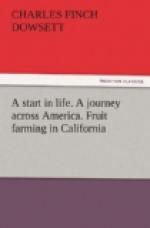where the yucca palm is plentiful. A fellow passenger,
and old settler, enlivened the time by some relations
of his experiences thus: He once shot a grizzly
bear which weighed 1,500 lbs. Some are much larger
than this. Everything of weight in America is
generally reckoned by pounds, not cwts. or tons.
On another occasion he slew a Californian lion.
He had killed a bullock, and the carcase was hanging
in his house at the back, where was an aperture like
a small window without glass, and under this opening
outside stood an empty case. The lion scenting
the carcase, and hearing no sound from within, approached
the house, and was endeavouring to creep through the
aperture when, in its efforts to do so, it kicked the
case away, and the poor animal was stuck fast, having
its head and shoulders inside. My fellow traveller,
on returning home, was surprised to find his visitor,
and so despatched him with an axe, and has for years
used the skin, which is 9 feet 8 inches long.
The temperature was charming, although in the distance
we could see the snow-capped mountains. We run
through the antelope valley, gather some juniper plant,
see a skunk, see natural oil wells at Saugus, pass
the head of the Santa Clara Valley, see the San Fernando
mountains, go through the greatest tunnel in America—the
San Fernando tunnel, 6,967 feet long, go by Burbank,
where there is a land boom, and arrive at Los Angeles,
where during the two hours of waiting I have a look
at the town and a pleasant chat with Mr. White Mortimer,
the British Consul, whom I called upon. The next
day (December 18th) we were on the desert of Arizona,
where we saw Indian camps at places which were somewhat
oases as to plant life. Speaking generally, nothing
grows on a great part of this desert but cactus, of
which I am told there are some 200 varieties, from
the dwarf kind to trees 40 feet high. This plant
has a strange if not a weird appearance. Here
and there, like solitary sentinels, stands out a tall
cactus, with perhaps two or three heads or branches,
growing perpendicularly with itself. The mountains
on either side look as if they had their origin in
volcanic eruptions.
Some parts of the desert are covered with a dwarf
kind of evergreen shrub. We see large numbers
of prairie dogs, which are of a size between a rat
and a rabbit; they live in holes like rabbits.
There are also gophers, skunks, prairie rats, rattlesnakes,
and hawks, which feed on snakes and rats. We
pass tribes of Yuma Indians, Aztec Indians and Gila
(pronounced Heela) Indians. On reaching a part
where is some grass we see some cattle, which are
straying on the line; the engine whistle shrieks,
the cattle run, and some coyote wolves are startled
from their lairs and run, too; large numbers are here,
and the preceding night their yells aroused some passengers
from sleep. As we proceed, quail are seen, and
wild cats something like a lynx. Arriving at Tucson
(pronounced Tewsohn), I enquired for a gentleman to




